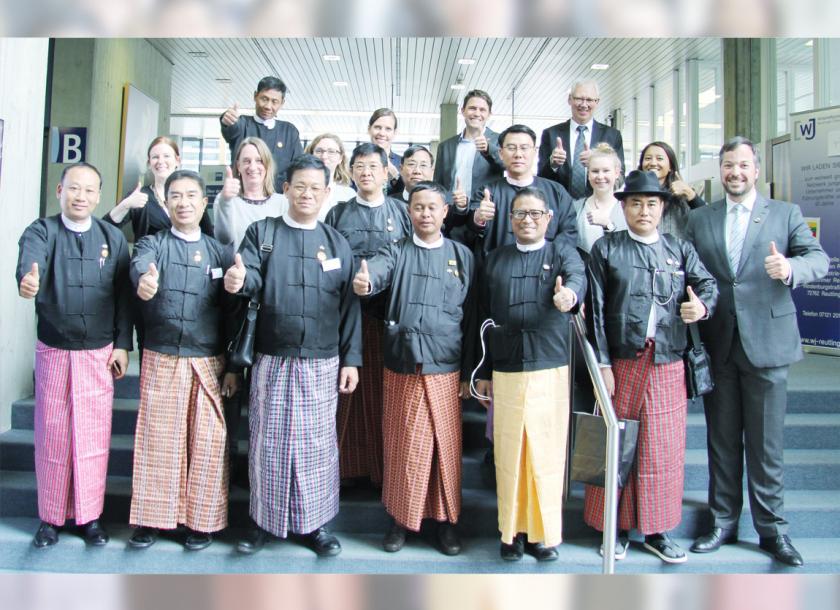Myanmar: Mandalay modernises chamber in bid to draw investments
The German IHK Reutlingen (Industrie und Handelskammer Reutlingen) is currently undertaking a three-year agreement with the Mandalay Region Chamber of Commerce and Industry (MRCCI) to restructure the latter and modernise its services and administration.
Patrick Jung, project manager in charge of the partnership, told The Myanmar Times that the IHK is advising the MRCCI on reforming and modernising the chamber. This includes the introduction of new membership services, improving the operational efficiency and chamber accounting information system, organising events and cultivating contacts abroad.
All these reforms efforts, funded by federal budget from Berlin, are implemented with the objective to strengthen the MRCCI as the business association of Myanmar’s second largest city, which is set to become the country’s northern economic powerhouse in the next few years. Berlin is providing EUR€900,000 for this partnership, which started in November 2015 and will last for three years.
“The partnership programme invests in intangible things, such as bringing in experts. It is also about making economic contacts, mostly with German businesses. For example, we [MRCCI] are conducting a conference call with a big German firm which is interested in producing electronics in upper Myanmar.
“We are trying to get a Germany-base Tobacco company to invest in Mandalay. If that is successful, it will create 1,500 jobs,” Mr Jung said.
He described IHK Reutlingen as the “eyes and ears and hands of German industries in Myanmar” and vice versa. The MRCCI is working towards scaling up the export of pulses and fruits to the European single market, after efforts to export mangoes last year failed.
Renewing collaboration
The current partnership programme will end in November 2018 but both sides are planning to renew the collaboration, according to IHK Reutlingen, with another agreement set for 2018-2021.
I want to have at least one company invest in Mandalay by the end of this partnership programme …
– Patrick Jung, Project manager
“It’s not a one way track, it’s definitely a two way track,” Mr Jung added.
The staff at the MRCCI has a traditional approach in management and the board members are volunteers in the way that they all have their own business to attend to.
Mr Jung’s role, as the project manager of the partnership, is to advise and coordinate, but ultimately the chamber drives its reform process.
Business chambers in Germany are funded by the government and provide much more services and functions than their Myanmar counterparts.
Mr Jung commented that IHK has a history spanning five centuries, and boasts 430,000 members in the region of Reutlingen in Germany.
Additionally, Berlin is in collaboration with the MRCCI and has supported seven senior experts so far to come to Myanmar to assist domestic companies in developing new products on a voluntary basis. For example, an expert in biscuits came to the country and advised a biscuit factory on improving its production.
“I want to have at least one company to invest in Mandalay by the end of this partnership programme and I want to export upper Myanmar or Myanmar goods to the European Union. It is not written in my assignment but, if you ask me honestly, that is what I want to do,” the project manager explained.
The MRCCI has establishing its website and Facebook page to improve communications with members and share information. The organisation is in the process of developing a regular newsletter.
These upgrades will be important for the chamber to support entrepreneurs with better services and knowledge transfer, while improving the dialogue between businesses and the local decision-makers, such as the regional government. Businesses have certain interest in certain questions, for example taxation, education, local service charges, infrastructure and bureaucracy.
“Myanmar is a new democracy, following years of military government. There wasn’t much dialogue before. But in an open society, such as in Germany, businesses can tell the decision- makers what they want and what they don’t want.
“The voice of the Mandalay economy is the MRCCI. It’s important to communicate what they need, for example to talk to the media and other stakeholders,” Mr Jung concluded.
Source: https://www.mmtimes.com/news/mandalay-modernises-chamber-bid-draw-investments.html


 Thailand
Thailand




